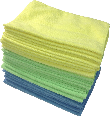If you have hard water, which is water that has an abundance of minerals such as calcium and magnesium in it, you may have noticed a tendency to get brown or white spots or stains under your faucets. Hard water is not bad for you—it can be a good way to get extra minerals—but you may find these marks ugly and want to get rid of them.
Because these stains come from your water, they may disappear when you rub them with a cloth, but they usually come back the next day or later. It is important to make sure you clean away these stains before they get too deep, since over time they become more difficult to remove, and they can become permanent if left too long.
Hard water is one type of stain that dish detergents and other emulsifiers will be ineffective at cleaning away. You also want to avoid using abrasive cleaners, because these, while they will remove hard water stains, will also remove some of the finish on your sinks and tiles. Chlorine bleach will work, but be careful to rinse it away quickly without leaving it on the sink or tile surface for too long, because it can also ruin the finish on your fixtures.
You may decide to buy one of the many products advertised to clean away hard water stains and residue. These are available in many grocery stores and drug stores. If you buy one of these products, you just need to spray or pour the product on, following the instructions that come with the product, and then rub it off with a clean cloth.
Another cleaning method you can try is to rub the area with slightly diluted white vinegar. Mix vinegar and little bit of water together in a bowl, dip your washrag into the mixture, and rub at the stains. Or, make a paste of vinegar and baking soda and let it sit on the stain for 15 minutes before rinsing the stain and the paste away. A paste of lemon juice and baking soda will also work on these stains.
Hard water stains come back, as you cannot avoid using your faucets. Prevent them from occurring again by wiping down your bathroom fixtures and kitchen sink with vinegar or with a mixture of vinegar and baking soda.

The Power of Microfiber! Zwipes Microfiber Cleaning Cloths will become your favorite tool for every cleaning task. This 36-cloth package is perfect for hundreds of uses in the garage, kitchen, bathroom, laundry, and all around the house. Each cloth is tough, streak-free, lint-free, reusable, and washable. Check out Microfiber Cleaning Cloths today!
Porcelain, while beautiful, often is a little difficult to keep clean. Many times porcelain sinks have a habit of ...
Discover MoreUse natural household products to clean your bathroom tiles in this easy method. You'll also learn a few tips to keep ...
Discover MoreIs there really anything more disgusting than a dirty bathroom? Help keep your bathroom sparkling clean by choosing the ...
Discover MoreFREE SERVICE: Get tips like this every week in Cleaning Tips from Tips.Net. Enter your address and click "Subscribe."
2024-09-16 08:37:11
Allen
You should be able to soak them in vinegar, Jeff. It won't hurt the plastic.
2024-09-16 08:25:57
Jeff Johnson
Question, will vinegar work if I have shower heads mostly plastic where most holes are clogged. Can I soak the shower heads in vinegar or should I put some vinegar in a bag, the tie the bag to the shower head so it is not touching the liquid and will the fumes from the vinegar unclog the holes, leaving this overnight?
FREE SERVICE: Get tips like this every week in Cleaning Tips from Tips.Net. Enter your address and click "Subscribe."
Copyright © 2026 Sharon Parq Associates, Inc.
Comments